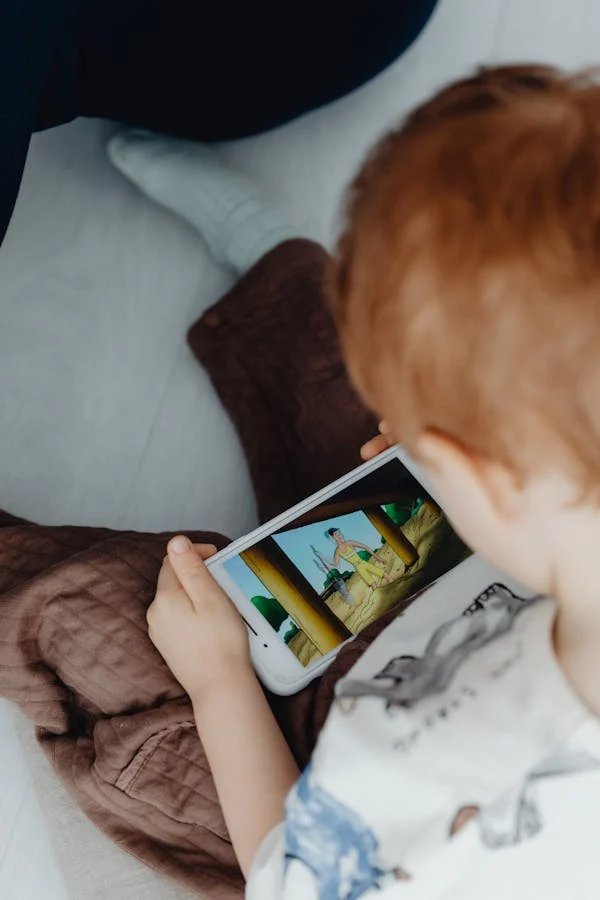|
Getting your Trinity Audio player ready...
|
Digital-Savvy Parenting in Saudi Arabia: Protecting and Empowering Your Child Online
مقدمة: رحلة الوالدية في عصر التكنولوجيا
لطالما كانت تربية الأبناء رحلة مليئة بالحب والصبر والتعلم. ولكن في زمننا الحالي، ومع تطور التكنولوجيا السريع، أصبحت هذه الرحلة أكثر تعقيدًا، حيث يُطلب من الوالدين توجيه أطفالهم في عالم رقمي متسارع.
في المملكة العربية السعودية، ومع تسارع التحول الرقمي بفضل رؤية 2030، أصبحت التكنولوجيا جزءًا لا يتجزأ من حياة الأسر. الهواتف الذكية، وسائل التواصل الاجتماعي، والألعاب الإلكترونية لم تعد مجرد أدوات ترفيهية، بل أصبحت جزءًا من الحياة اليومية للأطفال.
ومع هذه الفرص الرقمية، تأتي مسؤوليات كبيرة. فكيف يمكننا كآباء وأمهات أن نحمي أطفالنا من مخاطر الإنترنت، وفي الوقت نفسه نمنحهم الأدوات التي تساعدهم على النجاح في المستقبل الرقمي؟
هذه المدونة تقدم لك استراتيجيات عملية مستوحاة من مؤسسات سعودية رائدة وتجارب عالمية لمساعدتك على تربية جيل رقمي واثق ومسؤول.
فهم المشهد الرقمي في المملكة
شباب رقميون يقودون المستقبل
أكثر من 50% من سكان السعودية هم دون سن 25، مما يجعلها من بين الدول الأكثر شبابًا في العالم. هذا الجيل ولد في عالم رقمي: يلمسون الشاشات قبل أن يتعلموا المشي، ويشاهدون الفيديوهات قبل أن يقرأوا، ويتواصلون مع أصدقائهم عبر الإنترنت قبل اللقاء وجهًا لوجه.
من الرياض إلى جدة، يستخدم الأطفال تطبيقات مثل تيك توك، سناب شات، وروبلوكس للتعلم، والتعبير، والتواصل.
الإنترنت… سيف ذو حدين
رغم أن الإنترنت يفتح آفاقًا لا حصر لها للتعلم والإبداع، إلا أنه يحمل أيضًا مخاطر حقيقية مثل التنمر الإلكتروني، والمحتوى غير اللائق، وانتهاك الخصوصية.
وفقًا لهيئة الاتصالات وتقنية المعلومات (CITC)، فإن 76% من الأطفال بين عمر 8 و18 يستخدمون وسائل التواصل يوميًا، بينما 34% فقط من الأهالي يراقبون نشاط أطفالهم الرقمي. هذا الفجوة لا بد من ردمها.
حماية طفلك على الإنترنت: بناء بيئة رقمية آمنة
ابدأ بالتواصل الصادق
الثقة هي حجر الأساس في السلامة الرقمية. تحدث مع طفلك عن تجربته عبر الإنترنت دون إصدار أحكام. اسأله مثلاً:
ما هو تطبيقك المفضل الآن؟ أرني كيف يعمل؟
هل سبق وشاهدت شيئًا أزعجك على الإنترنت؟
الدكتورة أمل الشهري، الأخصائية النفسية السعودية، تؤكد أن الأطفال يفتحون قلوبهم عندما يشعرون أنهم يُستمع إليهم. المحادثات المنتظمة تعزز الشفافية وتقلل من السرية.
ضع حدودًا واضحة للتكنولوجيا
اصنع خطة وسائط عائلية تناسب ثقافتكم. مثلًا:
اجعل مائدة الطعام وغرف النوم مناطق خالية من الأجهزة لتقوية الروابط الأسرية.
حدد أوقاتًا للشاشات بما يتماشى مع القيم السعودية، مثل تقليص الاستخدام أثناء الصلاة أو المناسبات العائلية.
وتوصي وزارة التعليم السعودية بقاعدة “3-6-9-12” للشاشات:
لا شاشات تحت سن 3
ساعة يوميًا من 3 إلى 6 سنوات
ساعتان يوميًا من 6 إلى 12 سنة
الخصوصية أولاً: علم طفلك المواطنة الرقمية
الأطفال قد يشاركون معلوماتهم دون إدراك للعواقب. استخدم أمثلة بسيطة: هل تعطي مفتاح منزلك لغريب؟ رقم هاتفك لا يقل خصوصية.
قم بتفعيل أدوات الرقابة الأبوية على الأجهزة والتطبيقات. توجد أدوات مناسبة للسوق السعودي مثل Qustodio وGoogle Family Link. كما توفر حملة “واعٍ” التابعة لـ CITC موارد مهمة للإبلاغ عن الجرائم الإلكترونية.
التعامل مع التنمر الإلكتروني بالتعاطف
التنمر الإلكتروني ظاهرة عالمية، والمملكة ليست استثناء. علّم طفلك أن:
يفكر قبل أن ينشر: هل كنت ستقول هذا الكلام وجهًا لوجه؟
يحجب ويبلغ: استخدم الأدوات المتاحة في التطبيقات.
يطلب المساعدة: وطمئنه بأنك بجانبه لا لمعاقبته، بل لدعمه.
يوفر البرنامج الوطني لحماية الأسرة خطوطًا ساخنة واستشارات مجانية للمساعدة.
تمكين طفلك رقميًا: تحويل المخاطر إلى فرص
استثمر في التعليم الرقمي
يشهد قطاع التقنية التعليمية في السعودية نموًا سريعًا. شجع طفلك على استخدام التطبيقات المعتمدة مثل:
تمام: دروس تفاعلية متوافقة مع المنهج السعودي.
نون أكاديمي: منصة تعليمية تفاعلية بين الأقران.
أكاديمية خان بالعربية: دورات مجانية في البرمجة والرياضيات والعلوم.
شجع الإبداع لا الاستهلاك فقط
حوّل طفلك من مستخدم سلبي إلى مبتكر رقمي. حفّزه على:
إنشاء قناة يوتيوب يتحدث فيها عن هواياته مثل الطبخ أو الرقص النجدي.
الانضمام لأندية البرمجة مثل التي تنظمها SAFCSP.
تصميم فنون رقمية باستخدام تطبيقات مثل Procreate أو Canva.
علّم التفكير النقدي
ساعد طفلك على التمييز بين الحقيقة والتضليل. اسأله:
من كاتب هذا المقال؟ هل هو مصدر موثوق؟
هل هذا المنشور يعكس قيمًا إيجابية؟
يُدرّس الآن منهج “الإعلام والمعلومات” بدعم من اليونسكو في بعض المدارس السعودية لتأهيل الطلاب للتعامل مع المحتوى الرقمي بوعي.
سلّط الضوء على النماذج الإيجابية
عرّف طفلك على مبدعين سعوديين مثل:
رهف الحازة: مطورة تطبيقات وناشطة في تعليم الفتيات STEM.
عبدالرحمن المالكي: مؤسس Tweeps.AI في مجال الذكاء الاصطناعي.
قصصهم تُلهم الأطفال ليستخدموا التقنية من أجل الخير.
التوازن بين التقنية والقيم: النهج السعودي
اربط الحياة الرقمية بالقيم الإسلامية
استخدم التطبيقات لتعزيز الإيمان والثقافة، مثل:
iQuran: لتلاوة وتفسير القرآن.
التراث السعودي: جولات افتراضية في المواقع التاريخية مثل الدرعية.
تحدث عن السلوك الرقمي وأثره على الأخلاق الإسلامية: هل سيفخر الرسول ﷺ بما نكتبه أو نشاركه في هذه المجموعة؟
عزز الروابط العائلية بعيدًا عن الشاشات
وازن استخدام الأجهزة بأنشطة تعزز القيم:
خرجات أسبوعية للأسرة: مثل زيارة العلا أو سواحل البحر الأحمر.
ليالي حكايات: شارك أطفالك قصص الأجداد وتاريخ الوطن.
تعاون مع المدارس والمجتمع
انضم إلى لجان أولياء الأمور التي تطالب ببرامج محو الأمية الرقمية. كثير من المدارس السعودية، خاصة في مشاريع مثل نيوم، تنظم ورش عمل في الذكاء الاصطناعي والروبوتات.
(يتبع في الجزء الثاني: قسم الأسئلة الشائعة، القصة الواقعية، وال
Digital-Savvy Parenting in Saudi Arabia: Protecting and Empowering Your Child Online
Introduction: Navigating Parenthood in the Digital Age
Parenting has always been a journey of love, patience, and learning. But in today’s hyper-connected world, raising children comes with a new layer of complexity: guiding them through the digital universe.
In Saudi Arabia, where technology adoption is soaring—thanks to Vision 2030’s emphasis on digital transformation—families are witnessing a revolution in how children learn, play, and socialize. Smartphones, social media, and online gaming are no longer optional; they’re part of daily life.
But with great connectivity comes great responsibility. How do we, as parents, protect our children from online risks while empowering them to thrive in a digital future?
This blog explores actionable strategies, inspired by Saudi Arabia’s leading institutions and global best practices, to help you raise confident, responsible, and tech-savvy kids.
Understanding Saudi Arabia’s Digital Landscape
The Rise of Tech-Savvy Youth
Saudi Arabia is one of the world’s youngest nations, with over 50% of its population under the age of 25. This generation is digital-native: they swipe before they walk, stream before they read, and collaborate online before they meet peers offline.
From Riyadh to Jeddah, children are using platforms like TikTok, Snapchat, and Roblox to express themselves, learn, and connect.
The Double-Edged Sword of Connectivity
While the internet offers unparalleled opportunities for education and creativity, it also exposes children to risks like cyberbullying, inappropriate content, and privacy breaches.
According to Saudi Arabia’s Communications and Information Technology Commission (CITC), 76% of children aged 8–18 use social media daily, yet only 34% of parents actively monitor their online activity. Bridging this gap is critical.
Protecting Your Child Online: Building a Safe Digital Environment
Start with Open Communication
The cornerstone of digital safety is trust. Talk to your child about their online experiences without judgment. Ask questions like:
“What’s your favorite app right now? Can you show me how it works?”
“Have you ever seen something online that made you uncomfortable?”
Saudi psychologist Dr. Amal Al-Shehri emphasizes that children are more likely to share concerns when they feel heard. Regular chats foster accountability and reduce secrecy.
Set Clear Boundaries with Technology
Create a family media plan tailored to your household. For example:
Device-free zones: Keep meals and bedrooms screen-free to prioritize family bonding.
Time limits: Align screen time with Saudi cultural values, such as limiting use during prayer times or family gatherings.
The Saudi Ministry of Education recommends the “3-6-9-12 Rule” for screen time:
No screens under age 3
1 hour/day for ages 3–6
2 hours/day for ages 6–12
Privacy First: Teach Digital Citizenship
Children often share personal details without understanding the consequences. Use relatable analogies: “Would you give your house keys to a stranger? Your phone number is just as private.”
Enable parental controls on devices and apps. Saudi-specific tools like Qustodio or Google Family Link let you filter content, block unsafe sites, and monitor usage. The CITC’s “Aware” campaign also offers resources for families to report cybercrimes.
Combat Cyberbullying with Empathy
Cyberbullying is a global issue, and Saudi Arabia is no exception. Teach your child to:
Pause before posting: “Would you say this to someone’s face?”
Block and report: Use platform tools to stop harassers.
Seek help: Assure them you’ll support them, not punish them.
The Saudi National Family Safety Program provides hotlines and counseling for victims of online harassment.
Empowering Your Child Online: Turning Risks into Opportunities
Leverage Educational Technology
Saudi Arabia’s EdTech sector is booming. Encourage your child to use apps endorsed by the Ministry of Education, like:
Tamam: Interactive lessons aligned with the Saudi curriculum.
Noon Academy: A Riyadh-based platform for peer learning.
Khan Academy (Arabic): Free courses in coding, math, and science.
Foster Creativity, Not Just Consumption
Transform your child from a passive user to an active creator. Inspire them to:
Start a YouTube channel discussing hobbies, from cooking kabsa to traditional Najdi dance.
Join coding clubs like those organized by the Saudi Federation for Cybersecurity, Programming, and Drones (SAFCSP).
Design digital art using apps like Procreate or Canva.
Teach Critical Thinking
Help your child discern fact from fiction online. For instance:
“Who wrote this article? Is the source credible?”
“Does this post promote positive values?”
The UNESCO-backed Media and Information Literacy curriculum, now integrated into Saudi schools, equips students to analyze online content responsibly.
Celebrate Positive Role Models
Highlight Saudi digital trailblazers like:
Rahaf Al-Hazza, a young app developer advocating for girls in STEM.
Abdulrahman Al-Malki, founder of Tweeps.AI, showcasing Saudi innovation in AI.
Stories like these inspire children to use technology for societal good.
Balancing Tradition and Technology: A Saudi Approach
Anchor Digital Life in Islamic Values
Use technology to reinforce faith and culture. Download apps like:
iQuran: For Quranic recitation and tafsir.
Saudi Heritage: Virtual tours of historical sites like Diriyah.
Discuss how online behavior reflects akhlaq (Islamic ethics). For example, “Would the Prophet (PBUH) approve of how you’re treating others in this chat group?”
Strengthen Family Bonds Offline
Counteract screen addiction with culturally rooted activities:
Weekly family outings: Explore Saudi’s natural wonders, like Al-Ula or the Red Sea coast.
Storytelling nights: Share tales of Saudi history or family traditions.
Collaborate with Schools and Communities
Join parent committees advocating for digital literacy programs. Many Saudi schools, such as those in the NEOM smart city project, now host workshops on AI and robotics.
Frequently Asked Questions (FAQs) About Digital Parenting in Saudi Arabia
Q. How can I protect my child from inappropriate content without invading their privacy?
Balancing protection and privacy is challenging but achievable. Start by fostering trust through open conversations. Explain why certain content is harmful, using age-appropriate language. For example, compare inappropriate websites to “unsafe neighborhoods” they should avoid. Use Saudi-specific parental control tools like Qustodio or Google Family Link to filter content discreetly.
The CITC’s Aware portal also offers guides to block harmful sites while respecting your child’s autonomy. Involve your child in setting these boundaries—ask, “What rules do you think would keep us both comfortable?” This collaborative approach builds mutual respect and ensures they understand your intentions are rooted in care, not control.
Q.My child spends hours on TikTok and Snapchat. How do I reduce screen time without causing conflict?
Screen time battles often stem from a lack of alternatives. Instead of outright bans, co-create a family media plan. Designate tech-free times, like during iftar or family outings to places like Riyadh’s Boulevard City.
Encourage offline hobbies aligned with Saudi culture, such as learning Ardah dance or volunteering at local heritage festivals. Use apps like Screen Time (iOS) or Digital Wellbeing (Android) to set limits collaboratively.
Share stories of Saudi role models like gamer turned coder Nourah Al-Faisal, who balances tech passion with real-world goals. By framing screen time as a privilege tied to responsibility, you empower your child to self-regulate.
Q. How can I teach my child to handle cyberbullying?
Cyberbullying can leave lasting emotional scars. Equip your child with the “3 Rs”: Recognize, Report, Recover.
Teach them to identify bullying behaviors (e.g., mean comments, exclusion) and reassure them it’s never their fault. Role-play responses like, “I won’t engage—I’ll block and report.” Leverage Saudi resources like the National Family Safety Program’s hotline (1919) for immediate support.
Share the story of Fatima, a teen from Jeddah who overcame bullying by documenting evidence with her parents and working with her school to address the issue. Emphasize resilience: “Your worth isn’t defined by someone’s cruel words.”
Q : Are there Saudi-led educational platforms to make screen time more productive?
Absolutely! Saudi Arabia’s EdTech sector is thriving. The Ministry of Education endorses apps like Tamam for interactive learning and Noon Academy for peer-to-peer tutoring.
For coding, enroll your child in SAFCSP’s Code Club Saudi, which offers free workshops in cities like Dammam and Abha. Even gaming can be educational: Minecraft Education Edition is used in Saudi schools to teach teamwork and problem-solving.
Celebrate small wins—like when your child designs a digital project or earns a coding badge—to reinforce that tech is a tool for growth.
Q. How do I balance Islamic values with my child’s digital life?
Technology and faith can coexist harmoniously. Use apps like iQuran or Prayer Times to integrate worship into daily routines. Discuss how online actions reflect akhlaq (ethics).
Encourage content creation that celebrates Saudi culture, like YouTube videos about Al-Janadriyah Festival or TikTok tutorials on Arabic calligraphy.
Involve local imams or school mentors to host talks on digital ethics. By framing technology as a means to serve Allah and community, you help your child build a purposeful online identity.
Success Story: How One Saudi Mother Turned Fear into Empowerment
The Day Everything Changed
Noura, a mother of three in Riyadh, never imagined her 12-year-old daughter, Sara, would beg to quit school. Sara had always been bubbly and curious—a star student who loved robotics.
But one evening, Noura noticed Sara silently crying over her iPad. “It’s nothing, Yumma,” Sara insisted, shutting her screen. Weeks later, Sara’s grades plummeted, and she refused to attend her coding club.
Noura’s heart raced as she scrolled through Sara’s Instagram—hidden under a fake account. Her stomach dropped. Dozens of anonymous comments mocked Sara’s appearance: “Your glasses make you look like a robot.
No wonder you love coding.” Sara had been targeted by cyber bullies for months but feared her parents would confiscate her devices if she spoke up.
Breaking the Silence
Noura confronted her fears and reached out to a workshop hosted by the Aware campaign. There, she learned that 1 in 3 Saudi teens experience cyberbullying, but only 10% report it.
She realized her silence had unintentionally isolated Sara. That night, Noura knelt beside Sara’s bed and whispered, “I’m sorry I didn’t see your pain earlier. Let’s fix this—together.”
They devised a plan:
Document: Screenshot every hurtful comment.
Report: Use Instagram’s anti-bullying tools and file a report with Aware.
Heal: Attend counseling sessions at the National Family Safety Program.
Noura also enrolled Sara in a SAFCSP coding boot camp, where she met peers who shared her passion. Slowly, Sara’s confidence returned. She even designed an app called Cyber Shield to help teens report bullying anonymously.
A New Beginning
Today, Sara is a vocal advocate for online safety, speaking at schools across Riyadh. At a recent event, she told the crowd, “The internet tried to break me, but my family and community taught me how to rebuild myself—stronger.”
Noura, now a volunteer with Aware, reminds parents: “Our children don’t need us to be perfect. They need us to listen, learn, and fight alongside them.”
Final Thought: Your Child’s Digital Future Starts Today
The digital world is not a battlefield—it’s a playground, a classroom, and a canvas. As Saudi parents, we have the power to shape how our children navigate it. Protect them, but also trust them. Equip them with tools like critical thinking and empathy, and they’ll surprise you with their resilience.
Join the Movement
Vision 2030 isn’t just about economic transformation—it’s about preparing our youth to lead with integrity and innovation. Here’s how you can act now:
Educate Yourself: Attend free workshops by Aware or SAFCSP.
Start Small: Have one tech-free meal with your family this week.
Advocate: Urge your child’s school to adopt UNESCO’s Media Literacy Curriculum.
Share Your Story: Post your digital parenting journey with #SaudiSmartParents to inspire others.
Our children are the architects of Saudi Arabia’s future. Let’s give them the love, tools, and faith they need to build a kingdom where tradition and technology thrive as one.
Take the first step today. Your child’s digital journey awaits.
“The greatest gift you can give your children is the roots of responsibility and the wings of independence.” – Adapted from a Saudi proverb
Additional Resources
CITC’s Aware Portal: www.aware.gov.sa
SAFCSP Coding Clubs: safcsp.org.sa
UNICEF’s Parenting in a Digital Age Guide (Arabic): unicef.org














